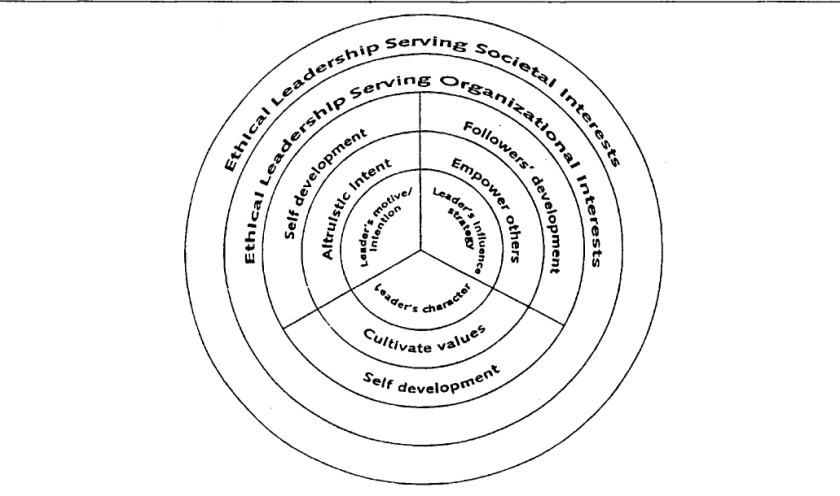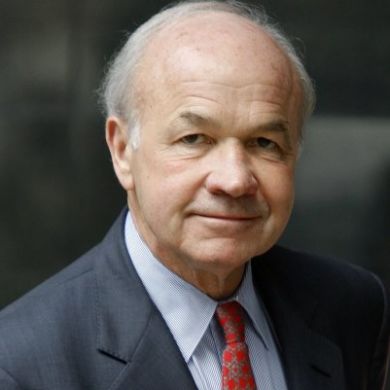This blog will discuss the topic of ethics and leadership within the banking industry, an industry I am currently interested in pursuing my career in. Not only will this blog mention the literature behind ethical leadership, but it will demonstrate examples of good and bad ethical leaders as well as apply relevant ethical leadership models. Dan Price for Gravity Payments is a good example of ethical leadership while Kenneth Lay for Enron is a bad example.
Many scholars (Kanungo 2001; Bass & Steidlmeier, 1999; Kanungo & Mendonca, 1996) have accepted that EL is based upon a morale foundation shaped by sets of ethical values that are grouped into the either deontological perspective (morale assumption) or the teleological perspective (consequential assumption) (White, 1993).
The noticeable similarity between these scholars’ definitions of ethical leadership (EL) is that it involves leaders’ demonstration and persuasion towards a “universal standard of moral behaviours” (Mihelic et al., 2010: 32) among their followers and this is done by actively engaging in two-way communications, having interpersonal relationships, and reinforcing ethical behaviours (Rubin et al., 2010: 216-17; Brown et al., 2005: 120; Thomas, 2001).
In order to evaluate and judge a leader’s behaviours to be ethical, the Dimensions of Ethical Leadership (Figure 1) by Kanungo and Mendonca (1998) should be mentioned.

Figure 1: The Three Dimensions of Ethical Leadership by Kanungo and Mendonca (1998)
As Figure 1 illustrates, the three core dimensions that separates a leader from an ethical leader are his or her intention/motive, character and influence strategy (Kanungo and Mendonca, 1998). Firstly, understanding the leader’s motive as an ethical leader must present a selfless altruistic motive. An example of an altruistic motive by a leader is Dan Price for Gravity Payments (view this short video).
Furthermore, an ethical leader should demonstrate a more transformational rather transactional mode of influence to his or her followers (Plinio, 2009; Martinez-Saenz, 2009; Frank, 2002). Dan Price has consistently demonstrated his concern for his employees and interest in positively affecting society. As shown in picture 1, he actively involves his employees in group exercises.

Picture 1: Dan Price, CEO of Gravity Payments (Source: Weise, 2015)
Finally, in order to be an ethical leader, a leader has to have incorporated ethical principles, developments and self-transformation into his or her beliefs and values. In this dimension, Kanungo and Mendonca (1998) have adopted the 1988 version of Blanchard and Peale’s (2011) five principles (5 P’s) of ethical power which are: “pride, patience, purpose, persistence and perspective” (Kanungo and Mendonca, 1998:143). In order for leaders to self-transform and become an ethical leader, they “must tap into these sources of ethical power” (Kanungo and Mendonca, 1998:143).
To demonstrate this, Price (shown in picture 1) in 2015 announced that he will raise the minimum yearly salary for employees earning less than $ 100,000 a year to $ 70,000 in order to secure them from financial hardship. He has financed this project by cutting his million dollar salary down to $ 70,000 only (Weise, 2015). Although this decision was criticized, Gravity Payments revenues began to grow twice as fast and employee retention rate was 91 % (Weise, 2015).
Kenneth Lay (Picture 2 and click here for full profile) was the CEO of Enron, an organisation that went bankrupt due to his unethical behaviours and violation of deontological ethics. Learn more about what happened to Enron by clicking here.

Picture 2: Kenneth Lay (Source: Bio., 2017)
The breaking of accounting had led to the company to go bankrupt and the dissolution of Arthur Andersen, one of the largest accounting firms in the world (Forbes, 2013), causing major job losses (BBC, 2002). Based on Lay’s actions, it is safe to assume that he followed a teleological approach in ethics as he based his decisions on the outcome that follows. His morale principles did not stop him from lying to investors and breaking violations since the consequences were beneficial until he was caught.
Therefore, to be an ethical leader is a difficult task. Based on my understanding of what it takes to be an ethical leader, it will be difficult to achieve this status in the banking industry. Based on my ethnic background and morale beliefs, I stand with a strong deontological approach to ethics. Since the banking industry has always been the face of unethical behaviour, it will even be more difficult to watch my leaders performing unethical behaviour to achieve the needs of the organisation such as Kenneth Lay. However, I learned that I am strong follower of the deontological and my industry is being surveyed by law enforcements for unethical behaviours.
References:
Bass, B.M., and Steidlmeier, P. (1999). Ethics, Character, and Authentic Transformational Leadership Behavior. Leadership Quarterly, 10, pp. 181-217.
BBC (2002). BBC NEWS | Business | Andersen guilty in Enron case. [online] Available at: http://news.bbc.co.uk/1/hi/business/2047122.stm [Accessed 5 Feb. 2017].
Bio. (2017). Kenneth Lay Biography. [online] Available at: http://www.biography.com/people/kenneth-lay-234611#synopsis [Accessed 6 Feb. 2017].
Blanchard, K. and Peale, N.V. (2011). The power of ethical management. Random House.
Brown, M. E., Trevino, L. K., & Harrison, D. A. (2005). Ethical leadership: A social learning perspective for construct development and testing. Organizational Behavior and Human Decision Processes, 97(2), pp. 117-134.
Forbes. (2013). 5 Most Publicized Ethics Violations By CEOs. [online] Available at: http://www.forbes.com/sites/investopedia/2013/02/05/5-most-publicized-ethics-violations-by-ceos/#7c07bfe22799 [Accessed 5 Feb. 2017].
Frank, D.G. (2002). Meeting the Ethical Challenges of Leadership. Journal of Academic Librarianship, 28(1/2), pp. 81.
Kanungo, R. N. (2001). Ethical Values of Transactional and Transformational Leaders. Canadian Journal of Administrative Sciences, 18(4), pp. 257-265.
Kanungo, R.N. & Mendonca, M. (1998). Ethical Leadership in Three Dimensions. Journal of Human Values, 4, pp. 133-148.
Kanungo, R.N., and Mendonca, M. (1996). Ethical Dimensions of Leadership. Thousand Oaks, CA: Sage Publications.
Martinez-Saenz, M. A. (2009). Ethical communication: moral stances in human dialogue. Current Reviews for Academic Libraries, 47(4), pp. 693-693.
Mihelic, K. K., Lipicnik, B., and Tekavcic, M. (2010). Ethical Leadership. International Journal of Management and Information Systems, 14(5), pp. 31- 42.
Plinio, A.J. (2009). Ethics and leadership.International Journal of Disclosure & Governance, pp. 277-283. Retrieved from http://0search.ebscohost.com.library.regent.edu/login.aspx?direct=true&db=a9h&AN=44824168&site=ehost-live
Rubin, R. S., Dierdorff, E. C., & Brown, M. E. (2010). Do Ethical Leaders Get Ahead? Exploring Ethical Leadership and Promotability. Business Ethics Quarterly, 20(2), pp. 215-236.
Thomas, C. (2001). The Ethical Leader. Executive Excellence 18, pp. 15. Executive Excellence Publishing.
Weise, K. (2015). The CEO Paying Everyone $70,000 Salaries Has Something to Hide. [online] Bloomberg.com. Available at: https://www.bloomberg.com/features/2015-gravity-ceo-dan-price/ [Accessed 5 Feb. 2017].
White, T.I. (1993). Business ethics: A philosophical reader. New York: Macmillan.
Yukl, G. (2006). Leadership in organizations, 6th edition. New Jersey: Pearson Prentice Hall Upper Saddle River, NJ.

The work is wonderful, I learned a lot from you, thanks
LikeLike
Thank you, Rebecca! What did you find most interesting?
LikeLike
Why it is difficult to be an ethical leader in banking industry? What risks will be taken?
LikeLike
Hi Chen Yang! Well, I believe it is difficult to be an ethical leader in the banking industry because above or below your position within a firm can exhibit unethical behaviours with or without your knowledge. Since banking deals with money, you can find many individuals offshoring money unethically or offering credit to consumers without official authority. If the person has higher authority over you, you may be in a position where you can’t say or do anything. This is similar to the case of Kenneth Lay and Enron. If the person is under your supervision, it may be a predicament if you fire this person and he whistle blows to the media; affecting your company’s brand image to shareholders or the public.
LikeLike
Wow, such a good answer, learned a lot from this, thank you!
LikeLike
That was great article, so do you think it that hard to be good ethical leader in term of real estate industry.
LikeLike
In my opinion, Ms. Achida, the real estate industry shares similar unethical dilemmas as the banking industry. Although, one can argue that it is dependent on the market and country, the unethical behaviors exhibited by top real estate executives and banking executives were jointly offering US citizens with house mortgages even though they have highly negative credit ratings. They knew that it would lead to an economic recession and cause devastating effects to the lives of economically unprepared individuals and families across the world and not just in the US. How justifiable is it to make a profit from the suffering and loss from the people of the world?
LikeLike
You know, I am really interested in the real-estate industry but I fear of doing business with unethical organizations.. How can I ensure that my peers and the people I work are transparent with me?
LikeLike
Don’t fear, Ahmed’s here. You can start by making yourself an exemplar for your followers. If you are transparent, try to make the culture between everyone around you positive and ethical. Once they have seen this from you, they may start to become more transparent.
LikeLiked by 1 person
Wow! I guess if it has to start from anywhere, then it should start from me.. In order to be an ethical leader, I must be the one who generates this feeling of morality to the people surrounding me, right?
LikeLike
Yes. I’m sure that’s the best way to succeed. If you have read the semler case study, you would find that Antonio failed to change the culture of Semco at first but then succeed when he broke the foundations of his beliefs and then his culture’s foundations
LikeLike
a clear information about ethics and leadership and great viewed the leadership and ethics i really enjoy and learn a lot thank for you sharing this post do you think ethics always matter for an outstanding leadership?
LikeLike
I believe that ethics should be an important component of leadership. In order to serve as a role model leader for others, the leader himself or herself must exhibit behaviors of morality and ethics. What do you think?
LikeLiked by 1 person
Great blog. Why do you think its hard to be an ethical leader in this day and age? Do you think Trump is an ethical leader?
LikeLike
Ohhh! Well it is definitely hard to be an ethical leader nowadays as people around will keep doing whatever it takes to get to the top. Well Trump is definitely unethical in many ways but he can be seen as ethical when he does what he promises to do.
LikeLike
Thankyou for your valuable insight.
LikeLike
Very well structured blog, Mr. Taha. I did gain some good knowledge about Dan Price and Kenneth Lay. My question to you is, the banking industry has always been associated with scams and issues of fraud, do you think every company that is ethical right now will be able to maintain its ethical status for a long time? Or is it purely in the hands of the leader of the organisation?
LikeLike
I believe it depends on the individuality within the culture of the organisation. Therefore, leaders can adapt the organization’s culture to maintain ethics within the organization
LikeLike